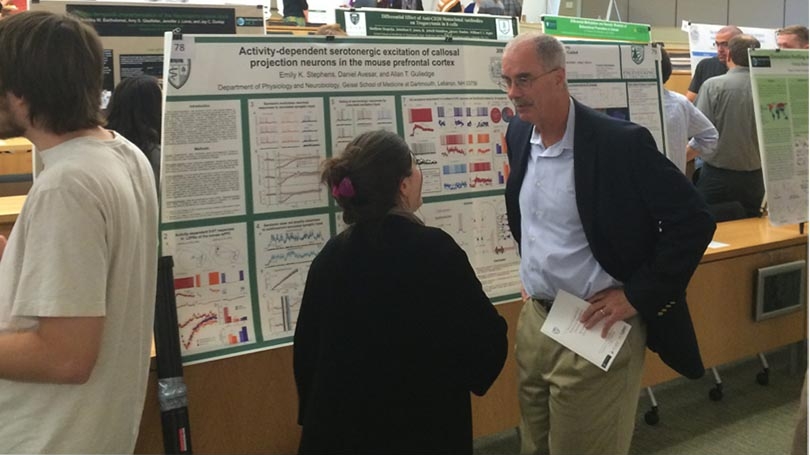
President Phil Hanlon discusses biomedical research with a presenter at the 2015 CBRaD event.
The 2nd Annual Celebration of Biomedical Research at Dartmouth (CBRaD) is coming up and registration is open.
Since awarding its first advanced degree in Classics in 1885, the graduate school at Dartmouth has grown, matured, and diversified into a range of graduate programs and degrees, with professors, postdocs, and students having built a significant foundation for higher-level scientific research.
In 2015, in order to demonstrate current research and to spark interest in inter-departmental collaboration, three student representatives from the Program in Experimental and Molecular Medicine (PEMM) created an annual celebration to provide a platform for scientific discourse among programs in the School of Graduate and Advanced Studies.
Fourth year PEMM student, Stephanie Getz, fifth year PEMM student, Itzel Rojas, recent PEMM graduate, Valeriya Posternak, and program administrator for PEMM, Gail Egner, worked together to create the Celebration of Biomedical Research at Dartmouth (CBRaD) based on a recommendation from Michael Spinella, former PEMM director.
Spinella had an ambition to connect all science at Dartmouth by creating an environment for sharing, critical analysis, and possible collaboration. Last year’s event, modeled to construct that environment, saw participants from PEMM, Quantitative Biomedical Sciences (QBS), Molecular and Cellular Biology (MCB), Thayer School of Engineering, and Chemistry. The event brought together 86 presenters ranging in levels of experience from graduate students, to postdocs, to faculty, and over 130 students, postdocs, faculty, and administrators attended the event.
Speaking about the success of CBRaD, Stephanie Getz explained that the event offers a “mechanism to get the entire scientific community together to talk about their research” and that the variety of research presented generates crosstalk, particularly for first year students who are exploring possibilities for thesis labs here at Dartmouth.
“There’s something to learn from everyone’s research, and although you can’t integrate everyone’s research with your own there is something to be gained by the different mindsets encountered in different sciences,” PEMM representative Itzel Rojas noted. CBRaD consists of a variety of topics, but it also represents a variety of theories, methods, and philosophies that can all be applicable across research areas.
Besides serving as a starting point for collaborative research and showcasing all the great labs at Dartmouth, the CBRaD conference also gives presenters the opportunity to develop their scientific presentation skills and receive high-quality feedback from other researchers. But, over free food, drinks and wine, the event makes sure to facilitate informal conversation between all attendees and presenters as well. In particular, this makes room for new graduate students to have candid conversation with students and faculty, helping them understand the labs they’d like to be part of in the future.
The poster competition is open to all science-based graduate programs, including Ecology, Evolution, Ecosystems, and Society (EEES) graduate program. Students, postdocs, and faculty who wish to present their research should prepare a poster and a 5-minute synopsis of their research. Poster presenters can choose to be judged to win an iPad, $100 gift card to Simon Pierce, or a $50 gift card to Starbucks.
Presenters are judged by a panel of faculty, postdocs and senior students carefully chosen from all participating science-based graduate schools. If participants would rather not compete, they can still present their research and be entered into a raffle ticket drawing for other prizes.
New to this year’s event is the opportunity to present an interactive poster with monitors and screens available by special request. Additionally, there will be a mentoring award. If you think your PI is the best, send in a cover-letter explaining why he or she is great, along with your PI’s CV or biosketch, and see if our panel of judges agree.
All others who would just like to attend need only RSVP to Gail Egner by October 12. As of today, there are over 45 posters already registered for the event with topics ranging from the circadian rhythm to big data analysis in the tumor microenvironment. This year’s CBRaD event will be held on October 20 from 5:00 – 8:00 p.m. in the second floor gallery of the Life Sciences Center.
If you are a scientist on the Dartmouth campus then this is an event you need to attend. When asked about what she wanted people to take away from attending the CBRaD event, Itzel Rojas said she hopes that everyone embraces the variety of the event. “It’s going to be like a museum,” she says. “I never would have thought to learn about or be exposed to such varied scientific fields, but I’m so glad that I encountered them.” PEMM and their co-hosts invite you to attend the second annual Celebration for Biomedical Research at Dartmouth to explore, learn, embrace, and maybe even improve your own science.